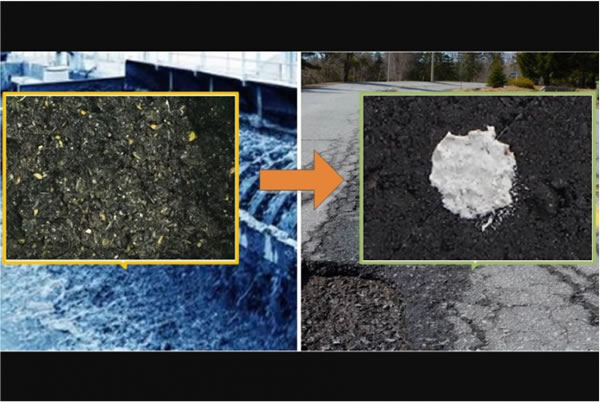According to a foreign media New Atlas report, after sewage and other wastewater is treated by a water treatment plant, a kind of gravel is usually left behind. These gravel usually end up in landfill, but soon they can be used as a more environmentally friendly repair material for ground potholes. Currently, potholes are filled with asphalt. Unfortunately, though, the material contains a toxic substance called polycyclic aromatic hydrocarbons. These substances are dangerous for construction workers and others who may be exposed to these hydrocarbons because they can seep out of the asphalt and enter the environment. The remaining gravel used in sewage treatment is also problematic. It is not only non-biodegradable, but because it contains pathogens, it cannot be recycled as is. With this in mind, researchers at California State University Bakersfield set out to make this substance more useful. They first mixed wet sand with calcium oxide and magnesium oxide to create a mortar that pathogens cannot proliferate. Next, they converted the slurry into mortar by adding a weak acid called potassium dihydrogen phosphate. The result is a chemically bonded phosphate ceramic (CBPC), which the team refers to as grit-assisted repair agent (GAP). In laboratory tests, it was found that the compressive strength of this material is similar to that of asphalt, but the researchers believe that when it is finally used to fill potholes, it should last longer than asphalt. In addition, it is non-toxic to the human body. Under the leadership of Dr. Zhongzhe Liu (transliteration), scientists are now assessing the degree of adhesion of GAP to existing pavements and are committed to further improving its compressive strength and durability. They plan to test it on normal traffic roads. The research will be presented at an online meeting of the American Chemical Society this week.
Nickel coating is a type of metal coating that is applied to a variety of substrates, including stainless steel, copper, and aluminum, to enhance their properties for specific industrial applications. This process involves the electroplating of a thin layer of nickel onto the surface of the substrate, providing it with excellent corrosion resistance, wear resistance, and surface smoothness.
Nickel coating is widely used in industries where materials require protection from corrosion, such as in the automotive, aerospace, and manufacturing industries. It is particularly effective in environments where exposure to harsh chemicals or high temperatures can cause metal parts to degrade over time. The nickel coating acts as a barrier layer, preventing the substrate from coming into contact with these harmful agents.
In addition to its protective properties, nickel coating also improves the mechanical and physical qualities of the substrate. The smoothness of the nickel surface reduces friction, which can extend the lifespan of the substrate. Nickel coating also enhances the substrate's electrical conductivity, making it an ideal choice for electronic components and circuit boards.
Nickel coating can be customized to suit specific applications. For example, the thickness of the nickel layer can be increased to increase corrosion resistance and hardness. Other variations of nickel coating include nickel-cobalt alloy and nickel-phosphorous, which offer even greater protection and superior chemical and heat resistance.
In conclusion, nickel coating is a highly effective solution for protecting substrates from corrosion, wear, and tear. Its versatility and customizability make it an attractive choice for a wide range of industries and applications. By providing superior protection and enhancing the performance of substrates, nickel coating plays an important role in ensuring the longevity and reliability of industrial systems and components.
Electroless Nickel Plating,Electroless Nickel,Nickel Chrome Plating,Black Nickel Plating Lizhi Precision Manufacturing Technology Co.,Ltd , https://www.lizhihardware.com